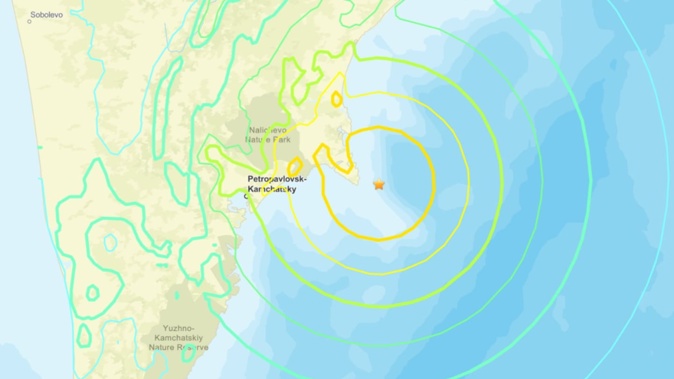
A 7.4-magnitude earthquake struck off the coast of Kamchatka in Russia’s far east on Saturday, the United States Geological Survey (USGS) said.
The quake hit 111km (69 miles) east of the Russian city of Petropavlovsk-Kamchatsky, the administrative centre of the Kamchatka region, at a depth of 39.5km, according to the USGS.
The Pacific Tsunami Warning Center said “hazardous” waves were possible along Russian coasts within 300km of the epicentre.
USGS earlier gave a magnitude of 7.5 before downgrading it.
A National Emergency Management Agency (NEMA) spokesperson told NZME there was no tsunami threat to New Zealand.
Second huge quake to strike the region in six weeks
In July, one of the strongest earthquakes ever recorded struck off the Kamchatka peninsula, triggering tsunamis up to 4m (12 feet) high across the Pacific and sparking evacuations from Hawaii to Japan.
The magnitude 8.8 quake was the largest since 2011, when a magnitude 9.1 tremor off Japan caused a tsunami that killed more than 15,000 people.
July’s quake prompted authorities in Japan to order almost two million people to head to higher ground.
Tsunami warnings were also issued across the region, before being rescinded or downgraded.
Buildings were damaged in the July 30 quake and several people were injured in Russia’s Kamchatka region.
A volcano on the Kamchatka Peninsula erupted days after the earthquake for the first time in hundreds of years, sending ash 6km into the sky.
July 30 quake sparked emergency warnings in NZ
New Zealanders were warned by NEMA to expect strong sea currents along coastlines following the July 30 earthquake.
“People in or near the sea in affected NZ areas should move out of the water, off beaches and shore areas and away from harbours, marinas, rivers and estuaries,” Nema said at the time.
“Strong currents and surges can injure and drown people. There is a danger to swimmers, surfers, people fishing and anyone in or near the water close to shore.
“People on boats, live-aboards and at marinas should leave their boats/vessels and move on to shore. Do not return to boats unless instructed by officials.”
However, due to New Zealand being so far away from the epicentre, the country was in a good position regarding a tsunami threat.
“Because we’re so far away, we have time because tsunami waves travel relatively slowly through the deep oceans,” University of Auckland senior lecturer, School of Environment, Dr Jennifer Eccles said after the July 30 tremor.
“We are in that position where we have time to know what to expect and because of the distance it has to travel, the energy will dissipate somewhat.
“By the time it gets here, it’s going to be much smaller than anything they will see at a local level.”
More to come
-Agence France-Presse, additional copy NZ Herald
Take your Radio, Podcasts and Music with you









